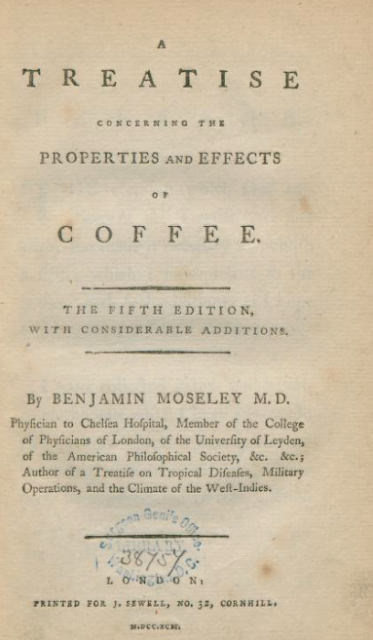
Thomas Rowlandson, A Mad Dog in a Coffee House, hand-coloured etching, ca. 1800
GUEST BLOG / By Benjamin Moseley, A Treatise Concerning the Properties and Effects of Coffee, 5th ed. (London: J. Sewell, 1792). Posted by PublicDomainReview.org 2023.
How did coffee become so popular in the Middle East, turning the Yemeni port city of Mokha into a global marketplace of beans for nearly three centuries? Benjamin Moseley, eighteenth-century physician and early anti-vaxxer, offers an origin story for coffee culture in the expanded fifth edition of his Treatise Concerning the Properties and Effects of Coffee (1792).
Noting that the account is a “ludicrous tale”, he nevertheless reproduces it in full.
One night a Yemeni goat herder found his flock restless. They would not sleep, but “jumped and frisked about as if they had been infatuated”. The herder summons a religious official from the local mosque, who notices that the goats had foraged on “shrubs and berries [that] had always been considered among the wild and useless productions of the earth”.
Intrigued, the holy man goes home and steeps himself a cup, which he “supped off hot”. Soon he too “began to dance and frisk about as the goats had done”. After the jitters wane, the man’s thoughts turn back to God, and he realizes that this concoction would “be an excellent thing to keep the Dervishes awake, when their duty obliged them to pray after dinner”.
The experiment was an “utmost success” and soon the drink spread through every nearby nation and “among all the religious of the East”.
Moseley was the eighteenth-century precursor to today’s third-wave connoisseur. He had strong opinions on roasting that might still hold water — “the closer it is confined at the time of roasting, and till used, the better will its volatile pungency, flavour, and virtues, be preserved” — and high standards of taste: following François Bernier, he relates that only two people in 1650s Cairo were capable of making a proper brew.
As a practicing physician, Moseley's interest in coffee was mostly medical and, although these debates still continue, he had little time for the uncaffeinated. In a terribly-aged analogy, he compares coffee alarmists to those who raise “declamations against mercury” and “nonsense against tobacco” — equally bunk. Some of the proclaimed benefits of coffee are familiar.
It combats “lethargy, catarrh, and all disorders of the head”. It “accelerates the process of digestion”, affects “the gastric powers”, and “diffuses a genial warmth that cherishes the animal spirits, and takes away the listlessness and languor”. It also helps hangovers: that “disorderly condition brought on by drinking bad fermented liquors, and new rum, to excess”.
Other benefits are perhaps less well-known today. If bedridden with “bloody flux” or dysentery, drink four cups of hot coffee and cover yourself with heavy bed clothes — you will soon be cured through perspiration; for messengers commuting long distances, “the alternate effects of opium and coffee” can soothe “their tedious journies”.
Aside from a caution to pregnant women and those with serious illnesses, the only negative account of coffee in this hundred-page treatise comes from a person Moseley met in Leyden: he “seldom drank much coffee, or continued the use of it for several days successively, without having a hæmorrhage from the nose.”
When the first edition of Moseley’s treatise appeared in the 1780s, Europe’s urbanites had been hooked on coffee for more than a century. London’s original coffee house opened in 1652; the French, who “knew nothing of it until 1645”, could enjoy a public café in Marseilles come 1671.
As Matthew Green details, these were intoxicating spaces where strangers mingled and discussed news, politics, scholarship, and everything in between. Part of Moseley’s polemic takes aim at those who charged coffee with inspiring treasonous activity in the veins of its stimulated sippers, such as the 1675 proclamation, under Charles II, that the “retailing of coffee might be an innocent trade; but as it was used to nourish sedition, spread lies, and scandalize great men, it might also be a common nuisance.”
Moseley was writing against the backdrop of an unfolding neurochemical revolution in Europe. As Wolfgang Schivelbusch argued in his heady "Tastes of Paradise: A Social History of Spices, Stimulants, and Intoxicants (1992)", after centuries of imbibing alcoholic beverages as their main source of potable water, European’s new fondness for boiled drinks — coupled with the psychoactive properties of caffeine — swapped societal tipsiness with a mindstate primed for the Enlightenment’s intoxication with reason.
(In a nonchalant aside, Moseley mentions how Voltaire once told him that he practically lived on coffee, for it “refreshed the brain, oppressed by study and contemplation”.)
Unfortunately, the raison principale behind Moseley’s treatise was far from enlightened. Most of the defense of coffee serves his argument that the British Empire should fund plantations in the West Indies and lighten taxation to drive down market competition.
In Jamaica, for instance, the would-be overseer will find “an easy employment; the labour light, and many parts of it performed by children.” When Moseley justifies this exploitation in his final paragraph as a way to ensure that “the [British] poor would be supplied with an wholesome ingredient for improving their diet”, we are left with only bitter grounds.

No comments:
Post a Comment